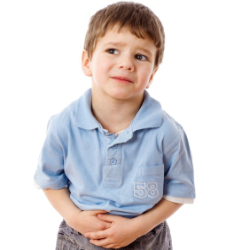Keeping stomach flu at a healthy distance

If there’s one visitor nobody wants around during the holidays, it’s gastroenteritis a.k.a. ‘the stomach flu’. During these colder months, from October to April, we’re at higher risk of getting the dreaded stomach flu, especially with children in the house. As much as we try to keep their hands clean and out of their mouths, it can be a losing battle. At school or at daycare, or even at home, kids often wash their hands too hastily after using the toilet, and later their fingers stray to their nose or mouth.
That’s one way the virus spreads, but it’s also commonly spread by an infected person preparing food without properly washing their hands. This is called the “fecal-oral route” because the virus lives in the stool or vomit of the infected person and finds its way into the mouth or nose of its next victim through sloppy hygiene.
‘Stomach flu’ is actually not flu at all, but gastroenteritis. Viral gastroenteritis is an infection of the lining of the intestines caused by a virus such as rotavirus or Norwalk virus. (Similar symptoms may be caused by bacteria such as salmonella, E. coli, or campylobacter (‘hamburger disease’) or the parasite, giardia.) It’s extremely contagious, especially amongst people in close quarters—schools and daycares top this list—and it continues to be contagious for at least three days after symptoms stop.
Symptoms
Symptoms
The symptoms of stomach flu are:
- watery, non-bloody diarrhea (bloody diarrhea can be an indication of a more serious condition),
- abdominal cramps and pain,
- nausea, vomiting or both,
- occasional body aches or headaches,
- possibly a low-grade fever.
These usually clear up after a day or two but sometimes hang on for up to 10 days.
Treatment
Treatment
Treatment for gastroenteritis aims at keeping the child well-hydrated by using oral rehydration solutions, such as Pedialyte (pre-mixed and found at your local pharmacy) and giving them to your childas often as they will take it. It is not advisable to use home-made solutions with orange juice and salt or other ingredients as the oral rehydration solutions are very precisely formulated to enhance absorption. If you’re breastfeeding your infant, continue to do so with supplements of an oral rehydration solution (e.g. Pedialyte). If your child is vomiting as well, try to give fluids frequently in small amounts (5 to 15ml, i.e. a teaspoon to a tablespoon) . Avoid giving your child juice, ginger ale or other sweetened liquids. Milk may be introduced after the first 12 to 24 hours as the diarrhea diminishes. Solid foods may be introduced as soon as the child is hungry and symptoms begin to diminish. Some parents prefer to introduce bland foods such as apple sauce, rice and bananas.
Watch out for complications
Watch out for complications
The most common complication of gastroenteritis is dehydration so watch for these signs in your child.
- dry mouth or skin
- increased thirst
- less frequent urination (or a dry diaper for more than three hours)
- if your child is an infant, watch for the fontanel (the soft spot on the top of the head) becoming sunken.
If you suspect dehydration, or your child has bloody diarrhea, is vomiting blood, is unusually drowsy, or has a fever that continues for more than two days, contact your physician or take your child to the Emergency Room. Children under the age of two years old are more susceptible to becoming dehydrated.
An ounce of prevention...
An ounce of prevention...
A recent vaccine against rotavirus is available to all infants in Quebec and protects them against a particularly nasty form of gastroenteritis; this vaccine is highly recommended. Apart from this vaccine, the best prevention is frequent and thorough hand washing especially after cleaning up your child’s vomit or diarrhea, using the toilet, or before preparing or eating food. It’s wise to clean the surfaces of your bathroom and kitchen with hot, soapy water which should kill any viruses that might be lurking there.
Viral gastroenteritis is thoroughly unpleasant and can be alarming when your child is suffering miserably, but the key is keeping your child well-hydrated. This is especially important with younger children and infants. With adequate hydration, gastroenteritis usually resolves over a few days. Occasionally a child may require intravenous hydration but gastroenteritis is rarely dangerous. So take heart…and wash those hands! Prepared by Dr. Richard Haber, Pediatric Consultation Centre (PCC), Montreal Children`s Hospital


